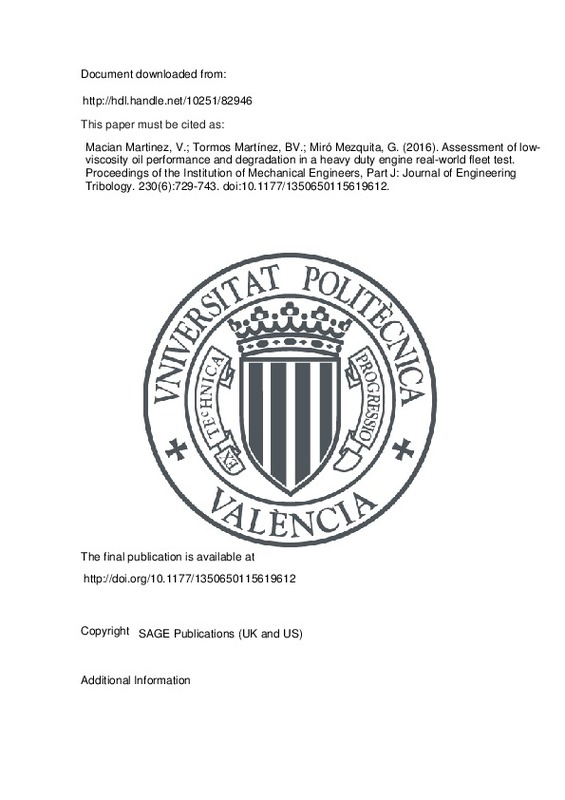JavaScript is disabled for your browser. Some features of this site may not work without it.
Buscar en RiuNet
Listar
Mi cuenta
Estadísticas
Ayuda RiuNet
Admin. UPV
Assessment of low-viscosity oil performance and degradation in a heavy duty engine real-world fleet test
Mostrar el registro sencillo del ítem
Ficheros en el ítem
| dc.contributor.author | Macian Martinez, Vicente
|
es_ES |
| dc.contributor.author | Tormos Martínez, Bernardo Vicente
|
es_ES |
| dc.contributor.author | Miró Mezquita, Guillermo
|
es_ES |
| dc.contributor.author | Pérez, Tomás
|
|
| dc.date.accessioned | 2017-06-16T07:45:32Z | |
| dc.date.available | 2017-06-16T07:45:32Z | |
| dc.date.issued | 2016-06 | |
| dc.identifier.issn | 1350-6501 | |
| dc.identifier.uri | http://hdl.handle.net/10251/82946 | |
| dc.description.abstract | Low viscosity engine oils (LVO) are considered one of the most interesting solutions for improving fuel economy in internal combustion engines (ICE). There are different studies involving LVO and ICE, but currently limited data are available regarding real-world performance of LVO in a real service fleet. Included in a broadest study related with fuel consumption saving effects and performance of LVO in a real service fleet, the aim of this work is to present the results obtained in terms of comparative oil performance. So, on this test, a comparative analysis using 39 buses was performed, based on a deep and extensive oil analysis program to assess those aspects above mentioned. Two engine technologies (Diesel and CNG) were considered and four different lubricants, two of them LVO and other two used as a reference baseline. The test duration comprised two oil drain intervals of 30000 km each one, totalizing more than 2 million of kilometers accumulated. Results have shown that LVO presented an excellent performance along the oil drain interval (ODI), even improving some characteristics of the baseline oils with higher viscosity values. Results have shown that oil degradation is more dependent on engine technology, but in any case presented a penalization in terms of ODI reduction, a key indicator for end-users related with maintenance costs. In the case of CNG engines, higher oil degradation in terms of oil oxidation and nitration was observed. | es_ES |
| dc.description.sponsorship | The author(s) disclosed receipt of the following financial support for the research, authorship, and/or publication of this article: This study was funded by the Spanish Ministerio de Ciencia e Innovacion (Project no. TRA2012-30907). | en_EN |
| dc.language | Inglés | es_ES |
| dc.publisher | SAGE Publications (UK and US) | es_ES |
| dc.relation.ispartof | Proceedings of the Institution of Mechanical Engineers, Part J: Journal of Engineering Tribology | es_ES |
| dc.rights | Reserva de todos los derechos | es_ES |
| dc.subject | Low-viscosity oils | es_ES |
| dc.subject | Oil degradation | es_ES |
| dc.subject | Fuel economy | es_ES |
| dc.subject | Fleet test | es_ES |
| dc.subject | Oil condition monitoring | es_ES |
| dc.subject.classification | MAQUINAS Y MOTORES TERMICOS | es_ES |
| dc.title | Assessment of low-viscosity oil performance and degradation in a heavy duty engine real-world fleet test | es_ES |
| dc.type | Artículo | es_ES |
| dc.identifier.doi | 10.1177/1350650115619612 | |
| dc.relation.projectID | info:eu-repo/grantAgreement/MINECO//TRA2012-30907/ES/Estudio de los potenciales efectos sobre el consumo y las consecuencias derivadas del uso de lubricantes de baja viscosidad en motores ligeros y pesados. (FUECOMOIL)/ | es_ES |
| dc.rights.accessRights | Abierto | es_ES |
| dc.contributor.affiliation | Universitat Politècnica de València. Escuela Técnica Superior de Ingenieros Industriales - Escola Tècnica Superior d'Enginyers Industrials | es_ES |
| dc.contributor.affiliation | Universitat Politècnica de València. Escuela Técnica Superior de Ingeniería del Diseño - Escola Tècnica Superior d'Enginyeria del Disseny | es_ES |
| dc.contributor.affiliation | Universitat Politècnica de València. Instituto Universitario CMT-Motores Térmicos - Institut Universitari CMT-Motors Tèrmics | es_ES |
| dc.description.bibliographicCitation | Macian Martinez, V.; Tormos Martínez, BV.; Miró Mezquita, G.; Pérez, T. (2016). Assessment of low-viscosity oil performance and degradation in a heavy duty engine real-world fleet test. Proceedings of the Institution of Mechanical Engineers, Part J: Journal of Engineering Tribology. 230(6):729-743. https://doi.org/10.1177/1350650115619612 | es_ES |
| dc.description.accrualMethod | S | es_ES |
| dc.relation.publisherversion | http://doi.org/10.1177/1350650115619612 | es_ES |
| dc.description.upvformatpinicio | 729 | es_ES |
| dc.description.upvformatpfin | 743 | es_ES |
| dc.type.version | info:eu-repo/semantics/publishedVersion | es_ES |
| dc.description.volume | 230 | es_ES |
| dc.description.issue | 6 | es_ES |
| dc.relation.senia | 316825 | es_ES |
| dc.identifier.eissn | 2041-305X | |
| dc.contributor.funder | Ministerio de Economía y Competitividad | es_ES |







![[Cerrado]](/themes/UPV/images/candado.png)

